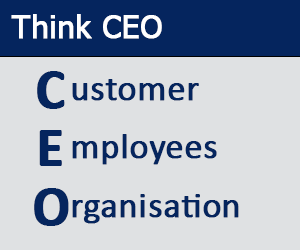Are you running a productive and efficient contact centre, or is there room for improvement?
Sometimes it’s hard to be certain – particularly if you’re relying on different sources of information to get a gauge on what’s really happening. Even then, it’s a challenge to know where to start on driving improvements.
If this sounds familiar, don’t panic! All of these challenges and more are explored in this series of tips from our expert panel, as they share their best advice for building a productive and efficient contact centre.
How to Improve Contact Centre Productivity
Regularly Review Why and How Customers Are Contacting You
One sure-fire way to make your contact centre more productive is to understand why your customers are getting in touch in the first place. Armed with this knowledge, you can begin to nip problems in the bud and reduce the volume of contacts coming in.
1. Think Proactively
Contact prevention is where the magic happens.
- Are there preventative steps you can take so customers are never impacted by a recurring issue?
- Is there a solution you can send to them in advance – before they have to reach out to your customer service team?
- Are there things your customers could be doing easily in a self-serve environment?
Think proactively. Look at trends. Make time to do the preventative work to resolve any issues – before customers become aware of them – and you’ll reap the rewards.
Contributed by: Sarah Morgan – Luceat Consulting
2. Assess Your FAQs

The rise of self-service is happening. People are choosing this!
Do you need to rethink your investment in people vs. technology? Are there FAQs you could develop for your customers to access?
Contributed by: Brian Atkinson – Five9 EMEA
3. Keep an Eye Out for New Reasons for Customer Contacts
Businesses are always changing, so it’s important that your contact centre teams monitor this. For example, has the launch of a new product driven an increase in contacts?
When a new issue is spotted, it’s key to take proactive steps to resolve it – and prevent the issue from landing on an agent’s desk in the first place.
Contributed by: Sarah Morgan
4. Stop Looking at Your Contact Centre in a Silo

The harsh reality of customer service is that ANY interaction tends to drive disloyalty – as something has typically gone wrong for the customer to be needing to contact you.
The impact of this is even greater when multiple contacts are required.
To run a truly efficient contact centre, you need to stop looking at things in silos.
Instead, look at how your contact centre currently supports your customers, employees and organization – and look for improvements.
It can help to think of these three audiences as the real CEO you need to impress!
Contributed by: Daniel Ord – OmniTouch International
5. Create a Self-Service Portal
Make it easy for customers to self-serve. We set up a self-service portal for our customers with easy access.
This empowered them to find their own answers from a knowledge base and to create their own incident tickets as needed – all on their own time. It was a win-win for our customer service experience.
Contributed by: Wendy
6. Demonstrate Where Other Departments Are Responsible for High Volumes
Easier said than done, but if you can demonstrate to the other departments in the business where they are responsible for driving volumes in the contact centre, you can take positive steps to change it!
In the longer term, when multiple problems are tackled at the root, you get rid of them in the first place. Taking a consistent approach should also keep customer service front of mind in other departments as and when they make changes.
Contributed by: Daniel Ord
Read our article ‘The Five Cs of Customer Service‘ outlining five key areas that you need to address to have contented customers.
Rethink Your Metrics – Are They Driving Inefficiencies?
So much of driving productivity and efficiency hinges on how you measure it in the first place. Not only can certain metrics drive poor agent behaviours and drain more time in the long term, but often they can provide a false positive on success.
7. Remove Short Abandons From the Equation
It can be hard to know where to draw the line on what to measure (and discount) in working out contact centre efficiency.
For example, contact abandon is not always bad – for a number of reasons. Consider removing short abandons from the equation for a truer picture.
Contributed by: Brian
8. Look at What’s Taking Your Agents Away From In-Call Time
To increase productivity, we first took a long, hard look at all the items that were taking our agents off the phones to complete.
This helped to ensure that any measures were capturing all tasks. Then we gave a goal of an Average Handling Time that realistically included everything it needed to – and didn’t cut the customers short.
Contributed by: Nichole
9. Focus on Outcomes – Not Volumes
We had a bonus system that worked really well.
We only focused on the results (in sales revenue). Quite simply, we could not push the agents to make more outgoing calls. This helped us create a more positive and productive environment.
Contributed by: Denitsa
10. Take a Balanced View on Measuring Quality
Be careful when deciding how to score agents on quality. I’ve seen examples of contact centres just using customer feedback and it doesn’t always go to plan.
As promising as it sounds, this can lead to agents giving customers everything they want (and falling out of process) to keep their own scores and feedback high.
You need to keep a balance – capture what’s important to your organization AND listen to customer feedback.
Contributed by: Daniel Ord
11. Too Much Focus on Occupancy Can Stress Your Agents
Occupancy is an organizational measure – not an agent measure!
I use it as a measure of how well we serve our staff, keeping their role meaningful and fulfilling, rather than using it as a ‘stick’ to drive stressful and poor behaviour.
Contributed by: Phil
12. Take a Quality-First Approach
Our focus has always been quality first.
We find that quantity follows with time and confidence.
Contributed by: Rohena
13. Stop the Obsession With Speed
So many organizations equate answering calls quickly with quality. Especially in the public sector. It’s time to do things differently!
Contributed by: Phil
14. Stop Looking at Individual Agent Productivity
When there are problems across the wider organization prompting multiple calls into the contact centre, it’s unfair (and ineffective) to then put controls on agents to measure productivity.
Rethink how and why you’re measuring agent productivity – particularly if you are targeting agents against:
- Number of contacts handled in service level environments
- Average Handling Time (AHT)
- Occupancy Rate
All of these can contribute to driving negative behaviours which compromise overall productivity.
Contributed by: Daniel Ord
15. Focus on Effectiveness – Not Efficiency

When you focus on efficiency, what can happen is that you do the wrong thing faster.
Being effective is about doing the right thing – and doing the thing right. Is it time you had a rethink about what you’re trying to achieve? Focusing on outcomes can make a world of difference.
Contributed by: Sarah Morgan
16. Measure Productivity and Quality BUT Monitor Them Separately
What if you took quality as seriously as productivity? What difference would you see?
Contrary to popular belief, productivity and quality aren’t at odds with each other. You need both to drive positive agent behaviours that contribute to overall efficiency.
One of the best ways to manage this is to score productivity and quality separately. Team leaders should aim to continuously move agents into higher levels of both.
When you start getting this right, you tend to see a positive knock-on effect. As contact centres are interrelated ecosystems, you’ll likely see a pattern such as:
Quality goes up, repeat contacts go down, customer satisfaction goes up, costs to handle additional interactions go down, Service Level(s) go up, Agent Occupancy goes down, engagement goes up, and so on.
Contributed by: Daniel Ord
For more information on contact centre metrics you should be measuring, read our article: 32 Contact Centre KPIs That You Need to Track (And Why!)
Keep an Eye on the Bigger Picture
There’s only so much the front line of the organization can achieve, if other departments are failing to be customer focused. Helping other people across the organization to understand their impact on the contact centre can make a big difference. Be careful to avoid driving change in isolation.
17. Remember… the Contact Centre Is Only Part of the Picture
When looking to improve productivity, call abandonment should be viewed as an organizational metric – with the leadership team taking responsibility.
It is intrinsically linked to the resourcing situation and the ‘ask’ of the contact centre. The contact centre is only a small part of resolving abandonment rate.
Contributed by: Phil
18. Be Realistic
When looking to make changes to drive efficiency, be realistic when considering if it will truly reduce call volumes.
Deeper analysis into the bigger picture and potential knock-on effect of the changes may very well reveal that it may not have the desired impact.
Contributed by: Brian
19. Forecast, Forecast, Forecast!!!
Contact centres which succeed are focused on reporting forwards – not historically.
Good forecasting is worth ten times good historic reporting. If you aren’t investing in this area, it’s time to make some changes!
Contributed by: Phil
20. Stop Spinning a Good Story – Look at What Matters
Beware “watermelon metrics” that look green and appealing on the outside, but don’t match up on the inside.
It’s easy to play the game and pick metrics that make the contact centre look good, but it’s useless if you aren’t really meeting customers’ needs. Balance your KPIs to drive up first-time fix instead.
Contributed by: Sarah Morgan
Watch our video ‘Beware of Watermelon Metrics‘ where Sarah explains this concept.
21. Could Your Forecasting Be More Accurate?
Better forecasting is the ultimate cost-efficiency!
What resources do you have in both people and technology for improving the accuracy of your forecasting? Could you be doing more?
Contributed by: Daniel Ord
Create a Better Customer Experience
Last but not least, do everything you can to create a better customer experience. If and when you do speak to your customers, you need to excel in meeting their needs.
22. Use Videos to Update Agents on Changes
Keeping information, updates and training front of mind is key to maintaining a good customer experience.
Why not use videos to update agents on any changes, so you can explain the whys and wherefores as opposed to endless emails or texts? It can be so much more effective.
Contributed by: Louise
23. Show Agents the Impact of Their Work
Show agents the impact of their behaviour – the good, the bad and the ugly.
Let them see what it means for the customers and business.
Contributed by: Phil
24. Empower Your Agents With Skills and Confidence

Empowering agents to be confident and skilled enough to sufficiently go the extra mile for a customer IS a productivity tool.
It reduces failure and repeat demand, whilst also providing outstanding experiences.
What are you doing to inspire and empower your agents?
Contributed by: James
25. Boost Employee Engagement for the Best End Results
Did you know… Companies with strongly engaged employees outperform their competitors by 147%. Make sure your efforts to create a productive contact centre also include plans to boost employee engagement. It can make a massive difference!
Contributed by: Sarah Morgan
26. Stop Treating Every Call With the Same Approach
Another efficiency challenge is in determining which calls require more time than others.
In my contact centre, certain calls are expected to be short and efficient, others are more complex and require more of our agents’ time.
We are considering setting different expected handling times to reinforce the distinction for the agents, as they tend to treat everyone with one approach.
Contributed by: Denis
27. Dig Deeper – Is the Call Really the First Contact?
TRUE first contact is an interesting metric. How well do you understand your customer journeys? Was that call really the first contact? Did the customer first try to solve the problem in their online account or app? Is the call really the third contact?
Until you know the answer, you can’t strive for improvement in this area.
Contributed by: Joshua
28. Train on Conversations – Not Channels

Put your time and energy into getting the conversation right! Don’t worry so much about spending time training on individual channels.
Once you realize your agents’ job is to have great conversations with customers (and they live and breathe it too), switching across channels is the easy part.
Contributed by: Daniel Ord
29. Incentivize Agents to Go the Extra Mile
Balance call time with incentivizing agents to go the extra mile to resolve the query.
On the surface, it looks like extra time – but in the bigger picture, spending just an extra 3 minutes on the first call can reduce the need for a repeat call – where the agent could take 5 minutes just getting through the basics.
Increasing Average Handling Time (AHT) can improve brand loyalty, C-SAT and profits.
Contributed by: Sarah Morgan
30. Take a Closer Look at How Your Voice Channel Is Performing
We’re still seeing 50% of contacts coming in via phone – on average. Sadly, there are still many bad voice experiences present in the industry.
Do you know where the inefficiencies are in your voice channel? How well do your IVRs and menu trees really work? Is it time to take another look?
Contributed by: Brian Atkinson
To find out more about contact centre productivity, read these articles next:
- How to Calculate Productivity in the Contact Centre
- 4 Key Objectives to Improve Productivity and Customer Experience
- Productivity Hack – A 4-Day Working Week
Author: Robyn Coppell
Published On: 5th Oct 2022 - Last modified: 5th Dec 2025
Read more about - Hints and Tips, Brian Atkinson, Daniel Ord, Employee Engagement, Five9, Leadership, Management Strategies, Performance Management, Productivity, Sarah Morgan, Team Management
















